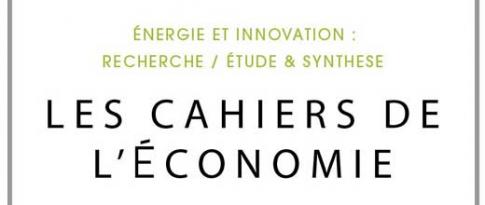22.01.2026
20 minutes de lecture
La collection “IFPEN Economic Papers” – anciennement « Les Cahiers de l’Économie », depuis 1990 – a pour objectif de présenter des travaux réalisés à IFP Energies nouvelles et IFP School qui traitent d’économie, de finance ou de gestion de la transition énergétique.
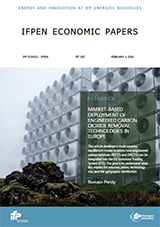 Market-Based deployment of Engineered Carbon Dioxide Removal Technologies in Europe
Market-Based deployment of Engineered Carbon Dioxide Removal Technologies in Europe
N° 165 – February 2026 [ RECHERCHE ]
Romain Presty
The article develops a multi-country equilibrium model to assess how engineered carbon removals (BECCS and DACCS) can be integrated into the EU Emissions Trading System (ETS). The goal is to understand what this implies for volumes, prices, technology mix, and the geographic distribution.![]() Lire la suite / Télécharger le numéro (PDF - 2.5 Mo)
Lire la suite / Télécharger le numéro (PDF - 2.5 Mo) ![]()
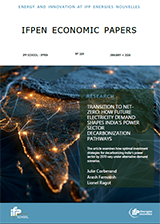 Transition to Net-Zero: How Future Electricity Demand Shapes India’s Power Sector Decarbonization Pathways
Transition to Net-Zero: How Future Electricity Demand Shapes India’s Power Sector Decarbonization Pathways
N° 164 – January 2026 [ RECHERCHE ]
Julie Corberand, Arash Farnoosh and Lionel Ragot
The article examines how optimal investment strategies for decarbonizing India’s power sector by 2070 vary under alternative demand Scenarios.![]() Lire la suite / Télécharger le numéro (PDF - 7 Mo)
Lire la suite / Télécharger le numéro (PDF - 7 Mo) ![]()
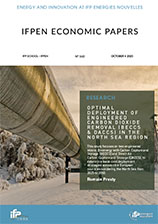 Optimal Deployment of Engineered Carbon Dioxide Removal (BECCS & DACS) in the Northsea Region
Optimal Deployment of Engineered Carbon Dioxide Removal (BECCS & DACS) in the Northsea Region
N° 163 – October 2025 [ RECHERCHE ]
Romain Presty
This study focuses on two engineered options: Bioenergy with Carbon Capture and Storage (BECCS) and Direct Air Carbon Capture and Storage (DACCS), to determine least-cost deployment strategies across nine European countries bordering the North Sea from 2025 to 2050.![]() Lire la suite / Télécharger le numéro (PDF - 6.5 Mo)
Lire la suite / Télécharger le numéro (PDF - 6.5 Mo) ![]()
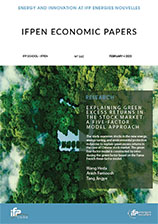 Explaining Green Excess Returns in the Stock Market: A Five-Factor Model Approach
Explaining Green Excess Returns in the Stock Market: A Five-Factor Model Approach
N° 162 – February 2025 [ RECHERCHE ]
Wang Heda, Arash Farnoosh and Tang Jingyea
The study examines stocks in the new energy, energy-saving, and environmental protection industries to explain green excess returns in the case of Chinese stock market. The green four-factor model is constructed by introducing the green factor based on the Fama-French three-factor model. Empirical results show that this model better explains the risk-return of green concept stocks compared to the three-factor model by verifying the existence of green excess returns, though its explanatory power still needs improvement. Therefore, the study uses stock turnover rate and the firm's return on investment as indicators of the sentiment factor and the efficiency factor, respectively, from the perspectives of green investment sentiment in behavioral finance and positive externalities in microeconomics. The green five-factor model is then constructed by introducing the green sentiment factor and green efficiency factor. Empirical results show that the green five-factor model better interprets the risk-return of green concept stocks compared to the three-factor model and the green four-factor model, with the green sentiment factor and green efficiency factor having a significant positive effect on the return of green concept stocks.![]() Lire la suite / Télécharger le numéro (PDF - 6.7 Mo)
Lire la suite / Télécharger le numéro (PDF - 6.7 Mo) ![]()
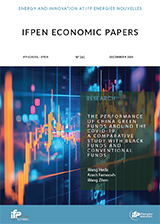 The Performance of China Green Funds around the COVID-19: A Comparative Study with Black Funds and Conventional Funds
The Performance of China Green Funds around the COVID-19: A Comparative Study with Black Funds and Conventional Funds
N° 161 – December 2024 [ RECHERCHE ]
Wang Heda, Arash Farnoosh and Wang Zhen
The analysis covers 102 green funds, 64 black funds, and 434 conventional funds in China, comparing their performance over 93 sample intervals from November 2015 to July 2023. The performance of green and black funds is significantly higher than that of conventional funds over the entire sample period, primarily due to the greater impact of COVID-19 on the industries in which conventional funds invest. Notably, green funds outperform black funds. When dividing the sample period at the onset of COVID-19, it is found that conventional funds generally outperform green and black funds before the pandemic, while green and black funds significantly outperform conventional funds during COVID-19. After COVID-19, as the state promotes economic recovery, conventional funds again outperform green and black funds. Overall, the performance of green funds gradually improves over time, with increased investment in large-cap and growth stocks.![]() Lire la suite / Télécharger le numéro (PDF - 4.1 Mo)
Lire la suite / Télécharger le numéro (PDF - 4.1 Mo) ![]()
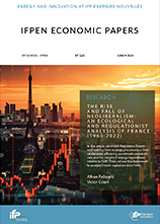 The rise and fall of Neoliberalism: an ecological and regulationist analysis of France (1960-2022)
The rise and fall of Neoliberalism: an ecological and regulationist analysis of France (1960-2022)
N° 160 – June 2024 [ RECHERCHE ]
Alban Pellegris and Victor Court
In this article, we enrich Regulation Theory with metrics from ecological economics: thermodynamic efficiency, exosomatic metabolic rate and the weight of energy expenditure relative to GDP. Then, we use this framework to analyze French capitalism since 1960.![]() Lire la suite / Télécharger le numéro (PDF - 3.4 Mo)
Lire la suite / Télécharger le numéro (PDF - 3.4 Mo) ![]()
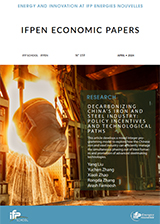 Decarbonizing China’s iron and steel industry: policy incentives and technological paths
Decarbonizing China’s iron and steel industry: policy incentives and technological paths
N° 159 – Avril 2024 [ RECHERCHE ]
Yang Liu, Yuchen Zhang, Xiaoli Zhao, Rongda Zhang and Arash Farnoosh
This article develops a mixed integer programming model to explore how the Chinese iron and steel industry can efficiently manage the simultaneous phasing out of blast furnaces and promotion of advanced steelmaking technologies.![]() Lire la suite / Télécharger le numéro (PDF - 4 Mo)
Lire la suite / Télécharger le numéro (PDF - 4 Mo) ![]()
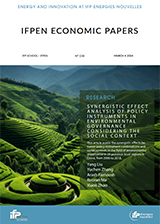 Synergistic effect analysis of policy instruments in environmental governance considering the social context
Synergistic effect analysis of policy instruments in environmental governance considering the social context
N° 158 – Mars 2024 [ RECHERCHE ]
Yang Liu, Yuchen Zhang, Arash Farnoosh, Ruoran Ma and Xiaoli Zhao
This article assess the synergistic effects between policy instrument combinations and social contexts in the field of environmental governance in 29 province-level regions in China, from 2006 to 2018. ![]() Lire la suite / Télécharger le numéro (PDF - 6 Mo)
Lire la suite / Télécharger le numéro (PDF - 6 Mo) ![]()
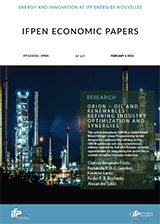 ORION - Oil and renewables refining industry optimization and synergies
ORION - Oil and renewables refining industry optimization and synergies
N° 157 – Février 2024 [ RECHERCHE ]
Clarissa Bergman-Fonte, Fernanda P. D. C. Guedes, Frédéric Lantz, Pedro R. R. Rochedo and Alexandre Szklo.
This article introduces ORION, a GAMS-based Mixed Integer Linear Programming model designed to optimize the refining sector. ORION addresses not only conventional refinery operations, but also focuses on novel opportunities for integrating the sector into a context of carbon intensity reduction.![]() Lire la suite / Télécharger le numéro (PDF - 4.1 Mo)
Lire la suite / Télécharger le numéro (PDF - 4.1 Mo) ![]()
> Archives des numéros (« Les Cahiers de l’Économie » - 2010 à 2023)
La forme et le fond peuvent encore être provisoires, notamment pour susciter des échanges de points de vue sur les sujets abordés. Les opinions exprimées dans cette collection appartiennent à leurs auteurs et ne reflètent pas nécessairement le point de vue d’IFP Energies nouvelles ou d’IFP School.
Ni ces institutions ni les auteurs n’acceptent une quelconque responsabilité pour les pertes ou dommages éventuellement subis suite à l’utilisation ou à la confiance accordée au contenu de ces publications.
Pour toute information sur le contenu, contacter directement l’auteur.






